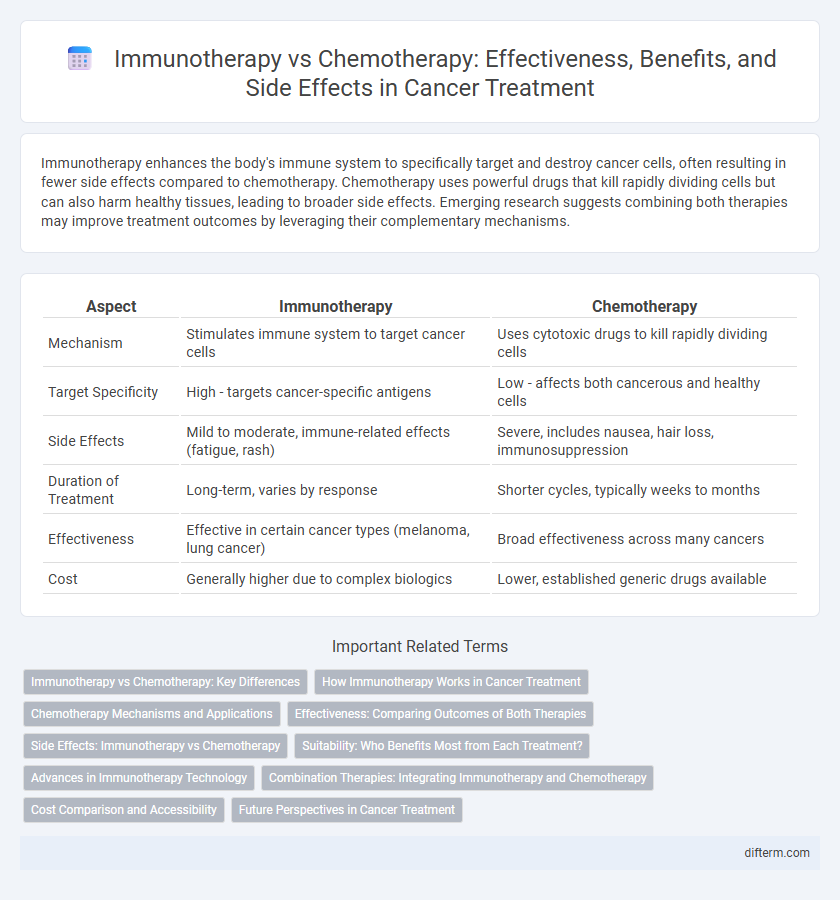Immunotherapy enhances the body's immune system to specifically target and destroy cancer cells, often resulting in fewer side effects compared to chemotherapy. Chemotherapy uses powerful drugs that kill rapidly dividing cells but can also harm healthy tissues, leading to broader side effects. Emerging research suggests combining both therapies may improve treatment outcomes by leveraging their complementary mechanisms.
Table of Comparison
| Aspect | Immunotherapy | Chemotherapy |
|---|---|---|
| Mechanism | Stimulates immune system to target cancer cells | Uses cytotoxic drugs to kill rapidly dividing cells |
| Target Specificity | High - targets cancer-specific antigens | Low - affects both cancerous and healthy cells |
| Side Effects | Mild to moderate, immune-related effects (fatigue, rash) | Severe, includes nausea, hair loss, immunosuppression |
| Duration of Treatment | Long-term, varies by response | Shorter cycles, typically weeks to months |
| Effectiveness | Effective in certain cancer types (melanoma, lung cancer) | Broad effectiveness across many cancers |
| Cost | Generally higher due to complex biologics | Lower, established generic drugs available |
Immunotherapy vs Chemotherapy: Key Differences
Immunotherapy leverages the body's immune system to target and destroy cancer cells, while chemotherapy uses drugs to kill rapidly dividing cells indiscriminately, affecting both cancerous and healthy tissues. Immunotherapy often results in fewer side effects and can provide longer-lasting protection against cancer recurrence compared to chemotherapy. Treatment selection depends on cancer type, stage, and patient-specific factors, with ongoing research optimizing combined and sequential use of both therapies.
How Immunotherapy Works in Cancer Treatment
Immunotherapy leverages the body's immune system to identify and destroy cancer cells by enhancing immune responses or training immune cells to target tumors more precisely. This treatment can involve monoclonal antibodies, immune checkpoint inhibitors, cancer vaccines, or T-cell therapies, each designed to boost immune activity against malignancies. Unlike chemotherapy, which directly attacks rapidly dividing cells, immunotherapy offers targeted cancer treatment with potentially fewer side effects by harnessing natural immune mechanisms.
Chemotherapy Mechanisms and Applications
Chemotherapy uses cytotoxic drugs to target rapidly dividing cancer cells by interfering with DNA replication and cell division processes. Common mechanisms include alkylation, antimetabolites, and mitotic inhibitors, disrupting the cancer cell cycle at various phases. Chemotherapy is widely applied in treating solid tumors, hematological malignancies, and as an adjuvant therapy to reduce tumor size pre-surgery or prevent metastasis post-surgery.
Effectiveness: Comparing Outcomes of Both Therapies
Immunotherapy harnesses the body's immune system to target cancer cells, often leading to longer-lasting remission and fewer side effects compared to chemotherapy. Chemotherapy uses cytotoxic drugs to kill rapidly dividing cells but may cause significant collateral damage to healthy tissue and presents variable response rates depending on cancer type. Clinical studies reveal immunotherapy shows superior effectiveness in cancers like melanoma and lung cancer, while chemotherapy continues to be essential for tumors less responsive to immune-based treatments.
Side Effects: Immunotherapy vs Chemotherapy
Immunotherapy generally causes milder side effects such as fatigue, skin reactions, and flu-like symptoms compared to chemotherapy, which often leads to severe nausea, hair loss, and increased risk of infection due to bone marrow suppression. Chemotherapy's side effects are typically more generalized and can severely impact rapidly dividing healthy cells, while immunotherapy targets specific immune pathways, resulting in immune-related adverse effects like inflammation of organs. Understanding these distinctions helps healthcare providers tailor treatment plans to minimize toxicity and improve patient quality of life during cancer therapy.
Suitability: Who Benefits Most from Each Treatment?
Immunotherapy is most suitable for patients with certain types of cancers such as melanoma, lung cancer, and bladder cancer, particularly those with tumors expressing high levels of PD-L1 or exhibiting microsatellite instability. Chemotherapy benefits a broader range of cancer types, including rapidly dividing tumors like breast, colon, and ovarian cancers, and is often used when cancers are more aggressive or widespread. Patients with strong immune systems and those who have not responded well to chemotherapy may gain more from immunotherapy, while those needing immediate tumor reduction typically benefit more from chemotherapy.
Advances in Immunotherapy Technology
Recent advances in immunotherapy technology have revolutionized cancer treatment by harnessing the body's immune system to target and destroy cancer cells more precisely than chemotherapy. Innovations such as immune checkpoint inhibitors, CAR-T cell therapy, and personalized cancer vaccines have significantly improved survival rates and reduced adverse effects compared to traditional chemotherapy. These cutting-edge therapies offer enhanced specificity, promoting long-term immune memory and minimizing damage to healthy tissues.
Combination Therapies: Integrating Immunotherapy and Chemotherapy
Combination therapies integrating immunotherapy and chemotherapy harness the immune-boosting effects of immunotherapy with the cell-killing power of chemotherapy, enhancing treatment efficacy against various cancers. This approach promotes tumor reduction by simultaneously attacking cancer cells directly and stimulating the patient's immune response. Clinical trials show improved survival rates and reduced recurrence in cancers like lung, breast, and colorectal when both therapies are combined.
Cost Comparison and Accessibility
Immunotherapy generally incurs higher upfront costs compared to chemotherapy, often ranging from $100,000 to $200,000 per treatment course, while chemotherapy treatments typically cost between $10,000 and $50,000. Accessibility to immunotherapy remains limited due to high costs, insurance coverage variability, and availability primarily in specialized cancer centers. Chemotherapy is more widely accessible globally, supported by broader insurance acceptance and established treatment protocols across diverse healthcare settings.
Future Perspectives in Cancer Treatment
Immunotherapy harnesses the body's immune system to target cancer cells more precisely, offering potential for personalized treatment with fewer side effects compared to traditional chemotherapy. Advances in immune checkpoint inhibitors, CAR-T cell therapy, and cancer vaccines are driving promising clinical trials and expanding therapeutic options. Integration of genomic profiling and artificial intelligence could further optimize immunotherapy efficacy, marking a transformative future in oncology care.
Immunotherapy vs Chemotherapy Infographic

 difterm.com
difterm.com